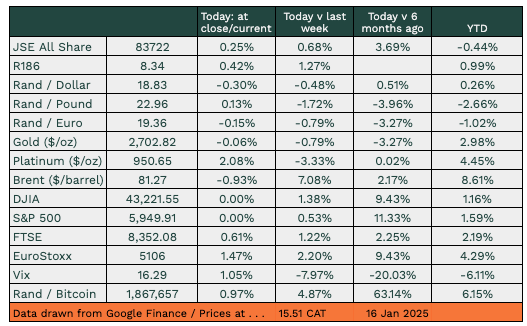It's four days until the US presidential inauguration day on Monday, January 20, 2025. How, one asks oneself at a moment like this, could one alienate the maximum number of people in the minimum amount of time? Well, how's this: should we fear or welcome a Donald Trump presidency". That would work. Something to infuriate everyone. Huzah!
So ... let's get into it.
By merely asking the question, you enter a space where angels fear to tread. People come at this question with such intensity and such bi-modal diversity. But it's worth asking. Surely?
Because there are such dedicated, distinct, angry views on the topic, just to be different, I’m tempted to say (and my liberal friends are going to hate me for even suggesting this), we should generally be indifferent to Trump’s second presidency. Wasn't expecting that, amirite?!
But, as a general rule, how far wrong can you go underestimating the amount of stuff politicians will do, as opposed to what they say they will do? In my experience, politicians are very good at the talking part and considerably less good at the doing something part. And you know, that’s not always such a terrible thing.
Humorist P J O'Rourke made the point that giving money and power to the government “is like giving whiskey and car keys to teenage boys." Even US founding father Thomas Jefferson was meant to have said, “The government that governs least, governs best." Economist Milton Friedman also weighed in on the topic, commenting once that “the government solution to a problem is usually as bad as the problem." And so on.
The indifferent argument runs like this: we know what a Trump presidency is going to be like because this is a re-run and he is an incumbent of a sort. His previous presidency was not significantly more disastrous (at least before his reponse, or lack thereof, to the pandemic) than any of his predecessors. Or, as it happens, his successor.
Pre-Covid-19, US GDP grew at 2.5% in the first three years of his presidency, which is slightly below the post-World War II average, but by a small margin. Unemployment dropped from 4.7% to 3.5% which is nothing to sneeze at and there was a net gain of 6.6 million jobs between 2017 and 2019, the first years of his term.
All of this was wiped out by the pandemic and Trump ended his presidency with a net loss of 2.9 million jobs. He became the first president with a net job loss since Herbert Hoover during the Great Depression. Not a great record, but … Covid. There are other consequences of the Covid crisis you could hang around his neck but at a macroeconomic level, I think his administration did neither much better nor substantially worse than other governments around the world. Covid was a global economic crisis, so he gets something of a free pass. Doesn’t he?
At this level, for all of the hullabaloo, you could argue that a Trump's first term in office was pretty uneventful, at least until Covid hit. He promised to build a wall on the Mexican border. He oversaw the construction of a wall 700 km long, but the US southern border is roughly 3 000 km long and Mexico sure as hell didn’t pay for it. He promised, with vigour, to keep out illegal immigrants. According to the Pew Research Center, they decreased by a tiny proportion, from 10.7 million to 10.4 million. He promised a trade war. Global trade increased.
It's not that he didn’t achieve anything; it's just that the needle didn't move much even for the things he was most animated about. This suggests that the intense fears democrats have about Trump 2.0 are overwrought. The battleship that is the USA just doesn't turn very nimbly. While politics matters greatly in some countries, as a rough generalisation, my sense is that government is much less important in day-to-day life for Americans than in many places elsewhere.
And you can see that in the voting statistics. Voter turnout of the eligible US population is about 60% in most elections. Turnout was fairly high in the past two elections, 67% and 64% respectively. I presume we can credit Trump (or the threat of Trump) for that! But European elections routinely have turnouts around 70%, although this proportion is declining.
So much for the benign argument. What about the argument that we should look forward to Trump’s second term? Shocker!
Surprisingly, to me at least, most of the world does! The European Council on Foreign Relations has just released a survey which suggests that all major regions outside of Europe are actually upbeat about Trump 2.0.

“Our poll of 28,549 people across 24 countries revealed four things. First, Europeans are almost alone in mourning Trump’s election. Second, many people in other countries see a Trump-led US as a 'normal' great power among many in an à la carte world. Third, the majority also believe the president-elect is committed to ending wars in Ukraine and the Middle East. And fourth, much of the world regards Europe as more powerful than Europeans themselves do. They say the European Union can act on equal terms with the US and China, the poll found.
Here are the key graphs.
I find the Indian example just incredible; Indians think Trump will be only marginally better for Americans than for Indians. And a greater proportion of Brazilians, Chinese, Turks, and South Africans expect Trump to be good not only for the US but for their countries too, as opposed to bad. (Lots of fence-sitters by the way.) Are we all going nuts?
Why do so many developing countries think Trump will be good for them? The survey itself rejects the notion that this is driven by warmth toward the winner, saying the findings point to something much more profound.
The world has changed; it's much more transactional. Great and “middle” powers seek partners transactionally in pursuit of their own national interests. “The monogamous marriages of the Cold War period are now history and middle powers have embraced polyamorous relationships, favouring different partners for different issues,” the poll commentators (all notable social commentators and historians) find.
My impression is that many countries around the world welcome a Trump presidency not because they are transactional but because they sense Trump is. There is something comforting in the sense that if worst comes to worst, you can always buy off your opponent.
They also welcome him because they have the impression he is less interested in using American military power than many other US presidents, visible in the ceasefire in Gaza.
Trump, never one to downplay his contribution, claimed on Truth Social: “This EPIC ceasefire agreement could have only happened as a result of our Historic Victory in November … We have achieved so much without even being in the White House.”
It sounds laughable, but diplomats do claim that the Trump team was willing to play hardball with the intransigent Israeli leadership, at one point threatening to withdraw US military hardware. Trump claims that the Ukraine crisis will be solved on "day one” of his presidency. It won’t. But nobody denies the ground has shifted.
The other argument in favour of a Trump presidency is that as a property developer by trade, he loves the idea of deregulation and smaller government. If the ousting of incumbents around the world last year tells us anything, it's that voters are worried that the governments have gotten out of hand. The taxes on everything, the small-minded interfering, the crazy regulations, the pious despotism, the millions of pointless jobs; we are just sick of it. Clearly.
What about the third argument: the world should actually fear Trump 2.0. Or to put it another way, this time it will be different.
There are four aspects to this argument:
First, in his previous term, Trump was unhinged but constrained. This time the shackles are off; he comes into office with a Republican party majority in both the Senate and the House. It's true, for the first two years, that was the situation during his first term.
But this time, there are few legacy leaders in the party and most Republican representatives are now devotional supporters rather than merely fellow party members. Serious business people have adopted prone positions to demonstrate their fealty. Contributions from businesses have led to a record-breaking fundraising total for the inauguration of over $170 million, surpassing previous records. Four years ago, President Joe Biden raised around $62 million for his inauguration.
Now the guard rails are off.
Second, he is now distinctly more decrepit. Trump was 70 when he was elected for his first term and is now 78. Biden was (rightly) castigated for not recognising the weaknesses that age sadly and inevitably brings on. But Trump will be older than Biden is now by the time he leaves office.
Hours and hours of his election speeches were completely unhinged. It was almost as though he was the proverbial king without the clothes; his devotional supporters were acutely aware that Biden was aging like last week’s milk, but just didn’t seem to notice their own candidate’s candles cost more than his cake.
His deranged ideas - changing the name of the Gulf of Mexico to the Gulf of America - and nutty senior cabinet choices were visible even before the swearing-in next week. And the real circus hasn’t even started yet.
Third, Trump’s big first-term victory, at least from his perspective, was reducing corporate taxes and adjusting individual income tax brackets downwards. The move certainly helped boost the economy. But that is done now, and the problem is now on the other side of the balance sheet. Federal debt rose from $19.9 trillion in January 2017 to approximately $27.8 trillion by January 2021 during his first term.
Biden didn’t bother to address this much, and it's currently $36.17 trillion. Government debt is now at levels which are throwing up red flags everywhere, as they are in many other countries, visible in the bond market. In the US, the rate on a 30-year fixed-rate mortgage is close to 7%, up a percentage point over the past few months.
Part of the problem is that governments have got used to running big fiscal deficits. The Economist reports that G7 governments are expected to run an average budget deficit of 6% of GDP this year.
The danger is not so much that Trump cannot implement his policies; the problem is whether he can and does. If Trump deports millions of people, he could boost inflation as employers lose workers. If he does increase import tariffs by 20%, that could increase prices too and spark Chinese countermeasures, including depreciating the yuan. And then we are into potential deflationary shock.
And fourth, there is his people management problem. He cannot get along with anyone for very long. In the election campaign, Kamala Harris’ best move was to highlight the number of people who worked with Trump who weren’t endorsing him this time around; they've seen him up close.
Not to indulge in school-kid psychoanalysis, but it's the curse of the narcissistic: by indulging in your own needs you are incapable of empathising with or prioritising the needs of others.
Personally, I worry that Trump could do something really nuts. His grip on reality is so poor, his advisors are so mixed and some even loony-toons, and his support base is so devotional. The chances of a dumpster truck disaster has to be pretty high.
Whatever. The circus is back in town. Look out for falling clowns.
From the department stuff that doesn't exist and if it does, we would have to kill you
Goodby to you my trusted spy friend
Wildly popular app TikTok is due to be shut down in the US on Sunday barring some last-minute reprieve, which has led to touching posts of TikTokkers saying goodbye for the last time to their Chinese spy. The posts poke fun at the security concerns notionally surrounding the app. “I just realised, nobody knows me like my spy,” lamented one TikTokker. “And thanks for sending me all those shirtless woodchopper posts; you know me better than I know myself!”. Etc.

From the department of things that weren't supposed to happen
Exporters rushing for the exits before, you know what

From the department of pass the popcorn right now!
Bannon vows to have Musk "run out" of the White House
Steve Bannon will "do anything" to keep Elon Musk out of the incoming administration, the former Trump White House adviser said in a new interview on Axios. This was after Musk condemned a segment of the MAGA movement as "contemptible fools" who should be purged from the Republican Party in a social media post on Friday.
Can this get any better? I don't think so.
From the department of fruit that is really badly misunderstood


Thanks for getting this far - apologies for the longish post. Please forward to a friend who might be interested. Till next time.
💥💥💥






Join the conversation